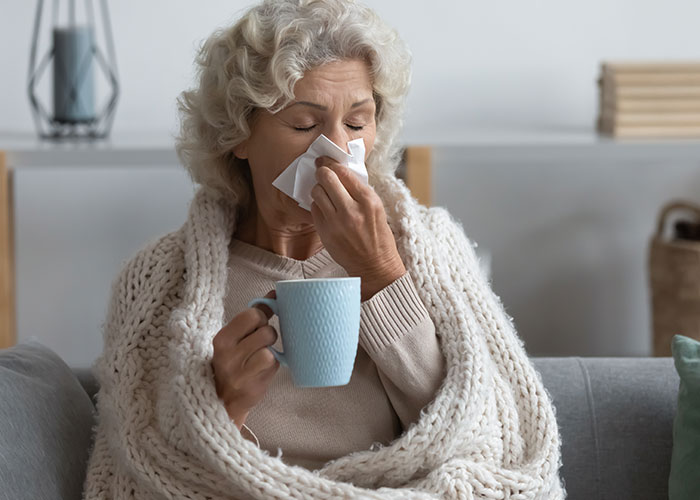Navigating Cold and Flu Season: Tips for Seniors

Autumn is prime time for cold and flu viruses to spread, especially as colder weather sets in and people spend more time indoors. As you get older, your immune system can weaken, making it harder to fight off these germs and increasing the risk that they’ll develop into something more severe like pneumonia. Individuals with chronic health conditions can be even more susceptible to illness.
Taking steps to reduce your exposure to cold and flu viruses and boost your body’s natural defenses can help keep you healthier this fall.
Table of Contents
Avoid Large Crowds
The more people you’re around, the more likely it is that someone is sick, whether they realize it or not. If you’re in a small, confined space such as an airplane or even someone’s home, you increase your chances of breathing these germs. Try to stick to well-ventilated areas where you can spread out and don’t have to be in close quarters with anyone for a prolonged period of time.
Wash Your Hands Frequently
Viruses can live on surfaces for hours or days. If you touch a door handle, railing, light switch, or counter and then touch your face, it is easy for these germs to enter your body and make you ill. Regularly washing your hands with soap and water or using hand sanitizer can help kill bacteria. Wipe down high-touch surfaces as well, especially after you’ve had people over.
Stay Hydrated
Drinking plenty of water is not only good for your skin, but it can also enhance your body’s ability to fight off germs. Sip on water throughout the day, not just when you feel thirsty. If you’re not a fan of plain water, add some fresh herbs or fruit for a flavor boost.
Eat a Healthy Diet
What you eat can positively or negatively affect your immune system. Develop a well-balanced diet that incorporates plenty of foods that are high in vitamin C, zinc, iron, and protein. Limit processed foods and focus on fresh fruits and vegetables as well as lean meats.
Boost Your Immune System
In addition to getting adequate vitamins and minerals to support immune health, staying physically active and getting a good night’s rest can also help your body fight off infection. Aim for at least 150 minutes of moderate exercise per week, doing a combination of aerobic activities and strength training. Try to work out earlier in the day and then get to bed at a decent time, giving yourself the chance to get at least seven hours of quality sleep. This allows your body to rest and promote healing.
Get Vaccinated
While there is not a vaccine for the common cold, there are annual vaccines that can help reduce your risk of contracting the flu as well as pneumonia. In fact, there are often specific dosages designed for seniors to improve your body’s ability to prevent and fight off these viruses. The vaccine does not guarantee you won’t get sick, but it can minimize the severity of symptoms if you do.
Stay Away from Individuals Who are Sick
If you know that a family member or friend is ill, avoid close contact with them. Reschedule your plans for a time when they are feeling better. Instead of shaking hands or hugging, you can wave hello or nod your head in greeting.
Likewise, if you are not feeling well, stay home so you don’t make others sick. Cough or sneeze into your elbow to help reduce the spread of germs and wash your hands after blowing your nose.
Stay safe in this cold and flu season and do your best to keep yourself in good health. Partnering with an in-home care provider can help you stay active, maintain good nutrition, coordinate appointments, and promote recovery if you are ill. Contact Always Best Care at (855) 470-2273 to learn more about the benefits of in-home care and schedule a free consultation.





